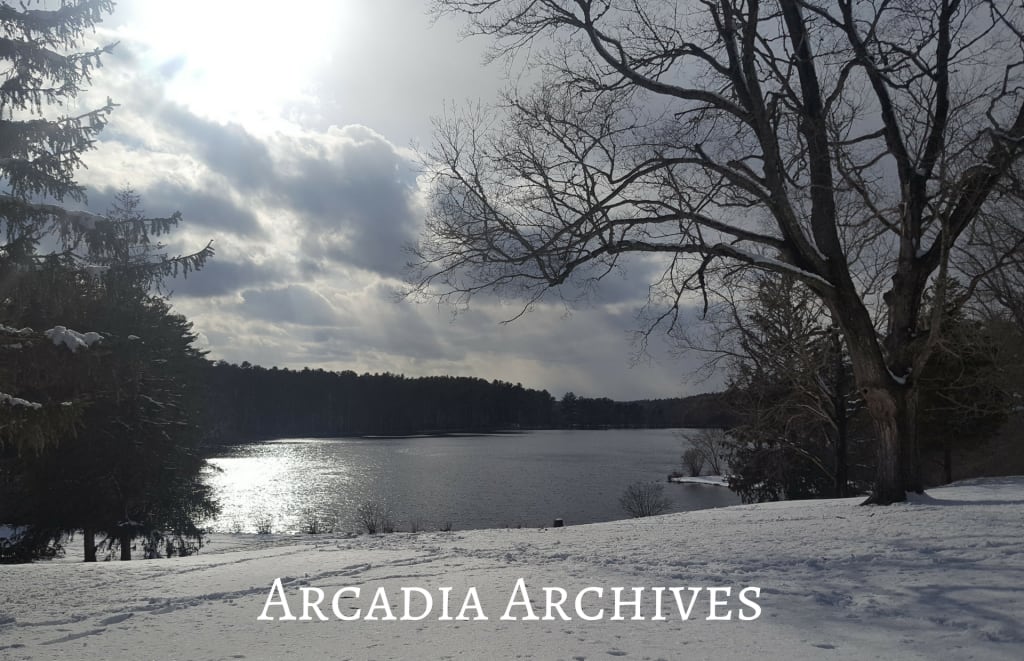Arcadia Archives IV
Healing Nature (Anxiety, Depression, and Peace)

Walk in the Park
The Arcadia Management Area in Rhode Island is a very rarely talked about gem that most people have passed or entered. It spans more than 14,000 acres, making it the largest recreational area in the state. Arcadia covers land in West Greenwich, Exeter, Richmond, and Hopkinton (including Browning Mill Pond, Breakheart Pond, and Frosty Hollow Pond). Here, wildlife and people converge.
State Eyes
Currently, the Rhode Island Department of Environmental Management is trying to claim a portion of this state park as its own. They wish to place a 13,000 square foot building at Browning Mill Pond. It will cost the state seven million dollars to create the building and there is no promise that it will be maintained by the group as other buildings under their care have become rather rundown. The building would be placed directly on the hill where many people meet to have picnics and also watch the sunset. It will cause more pollution in the area and could potentially drive away native species. Trees would be chopped and the current standing of the hill would need to be changed in order to hold the building.
The Human Aspect: Anxiety, Growth, and Water
Growing up in the Arcadia Management area, a two-minute drive from Browning Mill Pond, has been an immense blessing growing up. Throughout high school and college it was a haven. Even now, I find my way there during stressful times. Pulling into the parking lot with the windows down is sometimes enough to clear the clouds that have wandered into my brain. The fresh air, sometimes filled with the scene of pine needles, occasionally the smell of mud, fills and refreshes not only the mind, but the body as well. I’m not the only one that comes here during tough times. It is a common thing for people in the area. Over the past year, I have talked to numerous people who have said the sight of the water as they drive home was enough to soothe them.
After a shift at work, I would drive to the pond. Dealing with customers for eight or nine hours is sometimes a little tiring and enough to trigger a bad mood. The pond was a place to relax and delete the negative emotions that had begun as soon as I walked through the door of my job. The first view of the pond brought me to a neutral space, away from the doom and gloom mood that a pointless job can often lead to. After walking around the pond, seeing the rolling hills, the sparkling water, the streams, listening to singing trees, birds tweeting, and smelling the sweet smell of the freshly damp earth, I would be brought back to my peaceful center where I was almost certain nothing could flatten my newly replaced mood. Exercising at home was fine, but there was something more fulfilling about a walk through nature. A walk through an empty space where you only occasionally came across other people. The amazing thing about Browning Mill Pond is that we were all there for the same reason; we went for nature, not to communicate with other individuals although on some level we still were. We shared a love for nature and nature returned its love to us by placing us in a world of calm and certainty.
The natural environment at Browning Mill Pond helped soothe anxieties about an ill loved one as well. To avoid the stress of the day and the sometimes absolutely exhausting news from the hospital I went to the pond and sat on a picnic table that was frozen in the water. I sat and listened to the sounds of the water running behind me, the water under the bridge fighting the ice that it wanted to become. Through the environment, I gained hope and had a slightly more positive outlook on how the next few weeks would go. By coming here after class and before returning home, I was able to clear my mind enough to focus on classwork. Without it, I’m not sure how my time at the University of Rhode Island would have gone. Browning Mill provided a space of calm, clarity, and peace in a time of uncertainty.
The Science: Neurons and Nature
It has been proven in numerous studies that nature has a positive effect on the human mind and body while urbanization has the opposite effect. As buildings continue to pop up throughout our nation, so do cases of anxiety and depression.
In a study performed by Stanford, two groups of participants (38 individuals with no previous signs of mental illnesses) walked in varying landscapes; a natural environment with trees and grass, and also along a busy road with concrete and urban sounds. Before and after, their brain activity was monitored along with respiration rates. After the study, physical conditions didn’t vary among the participants very much, but there were noticeable differences in the brain activity. Those that had walked in the natural environment had decreased activity in the area of the brain dealing with rumination (subgenual prefrontal cortex), they spent less time dwelling on negative emotions. During stressful times, I have found that while at Browning Mill Pond I forget about negative moods, but while surrounded by buildings and the overly busy New England world, very little could lift the thoughts that had triggered the bad mood.
It has been found that “city dwellers have a twenty percent higher risk of anxiety disorders and 40 percent higher risk of mood disorders as compared to people in rural areas” (Jordan). It is important that our rural areas remain rural and that the limited open spaces in Rhode Island continue to be free of concrete and large buildings. A new building in a local park is one step towards urbanization. It is already widespread throughout Rhode Island and other states in America. It is imperative that we try to remain a rural area. Nature is important for our mental, emotional, and physical well-being. Our government must take care of it. If they do not show the responsibility to do so, then it is up to the public to protect it.
Works Cited:
Stanford University. “Stanford Researchers Find Mental Health Prescription: Nature.” Stanford News, 9 Apr. 2016, news.stanford.edu/2015/06/30/hiking-mental-health-063015/.
About the Creator
Katrina Thornley
Rhode Island based author and poetess with a love for nature and the written word. Works currently available include Arcadians: Lullaby in Nature, Arcadians: Wooden Mystics, 26 Brentwood Avenue & Other Tales, and Kings of Millburrow.






Comments
There are no comments for this story
Be the first to respond and start the conversation.